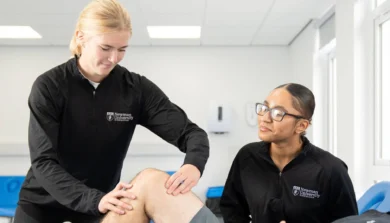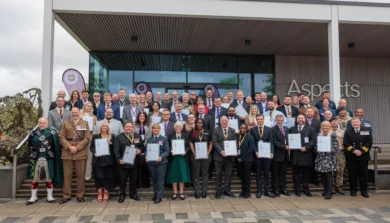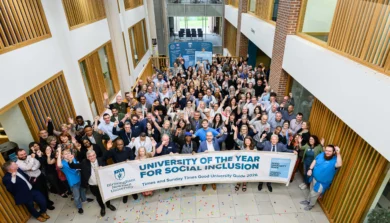BSc Single Honours Accounting and Finance (Top-Up) (Full-time)
Foundation
- Start date
- –
- Study mode
- –
- Course length
- –
- UCAS Code
- –

Interested in a different start date?
This course is intended to provide principal knowledge and skills in the thematic pathways of:
– Financial management and probity that will enable operational effectiveness in a modern organisation
– Decision making by organisations in the corporate environment with regards to investment appraisal
– The current research in technical and theoretical areas of accounting
– The effective design, supervision and management of organisational operations and processes
– The role of legislation in regulating internal control and ethics of an organisation in a modern society and the extent to which this currently addresses growing concerns and sustainability of an organisation, corporate law, audit & assurance
On the successful passing of our top-up degree modules, you would be able to submit applications to ICAEW, ACCA and IFA. for four exemptions from their postgraduate accountancy training programmes, with the option to apply for additional exemptions dependant on past experience. Exemptions could save you time and could give you a competitive advantage against graduates from unrelated courses applying for accountancy roles. Dependant on the modules you have taken and the professional body you choose to train with, you could expect to be a qualified accountant within one a half to two years of graduation, as opposed to the three to four years it might take a graduate from an unrelated degree. (See our Exemptions section of the Overview block for more information).
As well as focusing on the area of Accounting, our degree also explores key financial theories, which could give you an advantage against those who have studied other accountancy qualifications. By studying our top-up degree in Accounting and Finance, as opposed to other routes into the profession, you will be benefit from learning within a supportive university environment, developing a toolkit of vital transferable skills that can be applied to a wide range of careers.
The BSc (Hons) Accounting and Finance (top-up) programme aims to:
– enable you to undertake a rigorous study of the theories and techniques related to accounting and financial management
– acquire and develop the practical skills essential within an accounting and financial environment
– develop knowledge, understanding and skills in line with the QAA benchmark statements for accounting and finance (QAA Accounting and Finance, 2016)
– develop and enhance transferable skills relevant to a range of employment opportunities in both private and public sector organisations including the third sector
– enable students to develop competence in accounting and finance alongside wisdom in its application sufficient for them to enhance their employability and possibly progress to postgraduate study
– develop in you the ability to blend theory and practice in complex situations in a systematic and creative way to improve financial and business performance
– encourage and support the spirit of intellectual curiosity and enquiry, an ability to tackle problem solving and the capacity for creativity.

Got a question you’d like to ask?
Entry Requirements UK home students all applicants will need to have 120 credits at level 4 and 120 credits at level 5 in a relevant Foundation Degree or HND. Some applicants will need to successfully complete the Accounting and Finance Bridging Module to support their transition into the programme. If you have specific questions about the Top Up Award or bridging module please contact Admissions.
The tuition fee for academic year 2025/26 is: £9,535
Additional costs
The University will review tuition fees and increase fees in line with any inflationary uplift as determined by the UK Government, if permitted by law or government policy, in subsequent years of your course. It is anticipated that such increases would be linked to RPI (the Retail Price Index excluding mortgage interest payments).
Check out our blog/news/events

Birmingham Newman University to Launch Sports Massage Clinic Open to the Public
Birmingham Newman University is excited to announce the upcoming launch of its brand-new Sports Massage…

Birmingham Newman University Achieves Silver Award Recognition for Commitment to Defence Personnel
Over 100 guests gathered at the National Memorial Arboretum in Staffordshire to celebrate thirty-six regional…

Birmingham Newman University Named The Times University of the Year for Social Inclusion
Birmingham Newman University is delighted to announce that it has been named University of the…

Dr Emma Powell Named Finalist in Birmingham Awards 2025 – Contribution to Education
Dr. Emma Powell SFHEA, Senior Lecturer in Primary ITE at Birmingham Newman University, has been…

Birmingham Newman University Library Recognised as THE Award Finalist for Pioneering AI Support
Forward-thinking work to support the responsible and innovative use of AI in academia has landed…

Book an open day
Find out about our next open day. Book now to secure your place.
Our Careers team provides tailored advice, placements and workshops to help you build confidence and prepare for life after university.

What careers could I consider?
– Financial accountant
– Management accountant
– Financial analyst
– Investment banker
– Tax consultants
– Internal/External auditor
This programme seeks to develop within you a range of relevant skills, knowledge, and capabilities that would enable you to pursue a career as professional accountants (subject to ICAEW, ACCA and IFA accreditation/exemptions), or for any career in finance, banking, administration and other management roles.
Also, you will develop the ability to conceptualise and solve practical problems by creating reasoned value judgements. In addition, you will be taught academic skills, report writing, and analytical skills apart from your academic studies which will equip them to adapt easily to the rapidly changing environment of work.
Exemptions
Top-up students will be able to submit applications to ICAEW and ACCA for exemptions from their postgraduate accountancy training programmes*. The number of exemptions granted will be these professional bodies will be dependent on students’ individual skills and experience, taking into consideration content of their foundation course studied prior to joining Newman. Therefore each student’s outcome will be different. Newman University will support you in the application process for these exemptions, in order for you to continue your professional journey after graduation.
* Please note that if you have a conviction for fraud the above professional bodies may not agree to exempt you.
Institute of Chartered Accountants of England and Wales (ICAEW)
Top-up students will be able to submit an application for up to six exemptions from professional exams as part of postgraduate accountancy training via ICAEW. These exemptions will save you time when applying for professional qualifications.
For more information about ICAEW’s Credit for Prior Learning please visit www.icaew.com/cpl
Association of Chartered Certified Accountants (ACCA)
Top-up students will be able to submit an application for between four to seven exemptions from professional exams as part of postgraduate accountancy training via ACCA.
For students who are awarded all seven exemptions, this means that they could save up to two years of further study before they are fully qualified with ACCA.
Institute of Financial Accountants (IFA)
Top-up students will be able to submit an application for four exemptions from professional exams upon graduation from Newman. The accredited modules are listed below.
Advanced Financial Reporting (IFA Direct unit – Level 7 Corporate reporting for strategic business advanced)
Financial Analysis (IFA Direct Unit – Level 5 Financial Management)
Principles of audit and Assurance (IFA Direct Unit – Level 5 Assurance)
Advanced Management Accounting (IFA Direct Unit – Level 5 Financial and Management Control)
The exemptions listed above are for future Newman University students. Current or past students should check with the Course Leader about the exemptions applicable to them.
Courses we think you'll also like

BSc Single Honours Business, Accounting and Finance with foundation and sandwich years (full-time)
- Start date:
- Various

BSc Single Honours Business, Accounting and Finance (full-time)
- Start date:
- Various

BSc Single Honours Accounting and Finance (full-time)
- Start date:
- Various

BSc Single Honours Business, Accounting and Finance with sandwich year(full-time)
- Start date:
- January 2026
